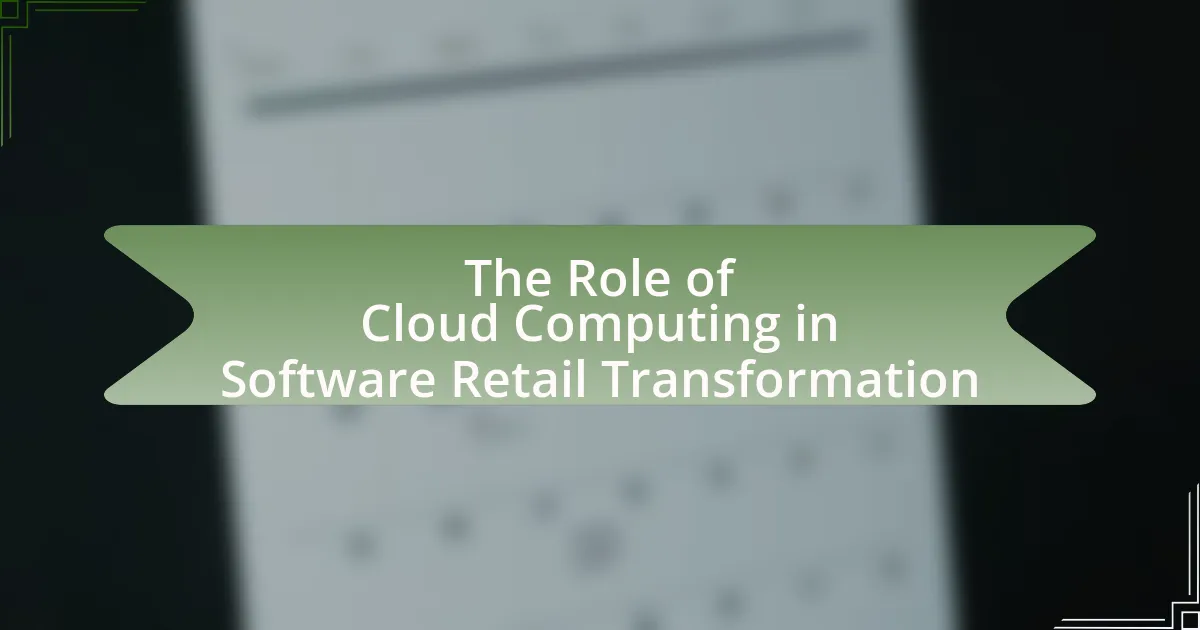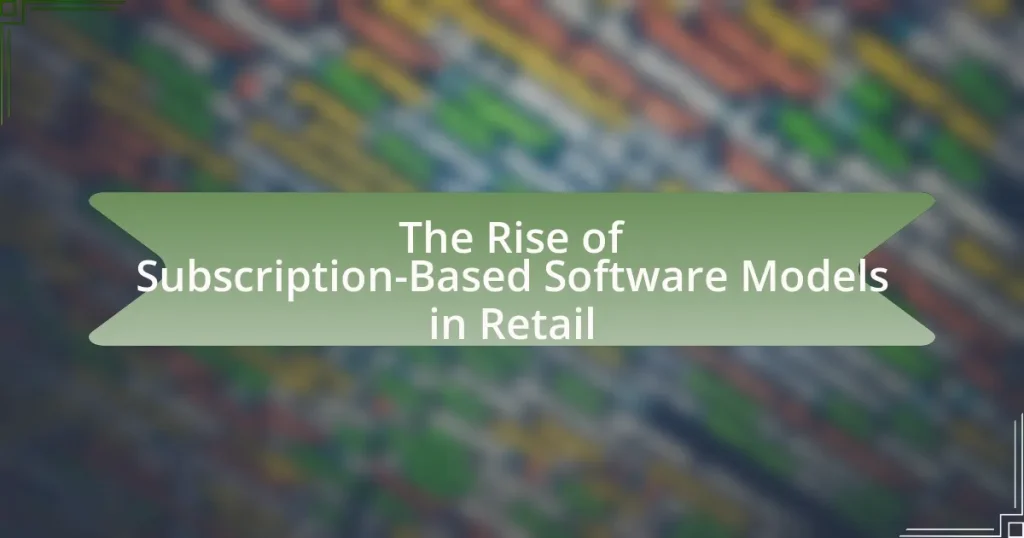Cloud computing is a transformative force in the software retail sector, providing scalable infrastructure, enhancing customer experiences, and enabling data-driven decision-making. This article explores the significant impact of cloud computing on software retail operations, highlighting its key features such as scalability, cost-effectiveness, and accessibility. It discusses how cloud solutions facilitate real-time inventory management, personalized marketing, and improved customer support, while also addressing the challenges faced by traditional retailers without cloud technology. Additionally, the article outlines best practices for implementing cloud computing and the common pitfalls to avoid, emphasizing the long-term financial benefits and operational efficiencies gained through cloud adoption.
What is the Role of Cloud Computing in Software Retail Transformation?
Cloud computing plays a crucial role in software retail transformation by enabling scalable infrastructure, enhancing customer experiences, and facilitating data-driven decision-making. It allows retailers to deploy applications and services quickly without the need for extensive on-premises hardware, which reduces costs and increases agility. For instance, according to a report by Gartner, organizations that adopt cloud services can reduce IT costs by up to 30%. Additionally, cloud computing supports real-time analytics, allowing retailers to personalize offerings and improve inventory management, ultimately driving sales and customer satisfaction.
How does cloud computing influence software retail operations?
Cloud computing significantly influences software retail operations by enabling scalable infrastructure and enhancing accessibility for both retailers and customers. This technology allows software retailers to store and manage vast amounts of data in the cloud, facilitating real-time updates and seamless distribution of software products. For instance, according to a report by Gartner, cloud services are projected to grow to $482 billion by 2022, indicating a strong shift towards cloud-based solutions in various sectors, including software retail. Additionally, cloud computing supports subscription-based models, which have become increasingly popular, allowing retailers to offer flexible pricing and reduce upfront costs for consumers. This shift not only improves customer satisfaction but also increases revenue predictability for retailers.
What are the key features of cloud computing that impact software retail?
The key features of cloud computing that impact software retail include scalability, cost-effectiveness, accessibility, and enhanced collaboration. Scalability allows software retailers to adjust resources based on demand, enabling them to efficiently manage fluctuating workloads. Cost-effectiveness is achieved through a pay-as-you-go model, reducing upfront investments in infrastructure. Accessibility ensures that software can be accessed from anywhere with an internet connection, broadening the customer base. Enhanced collaboration features facilitate real-time updates and teamwork among developers and retailers, improving product development and customer service. These features collectively transform how software is developed, marketed, and sold in the retail sector.
How does cloud computing enhance scalability for software retailers?
Cloud computing enhances scalability for software retailers by providing on-demand resources that can be adjusted based on fluctuating demand. This flexibility allows retailers to quickly scale their infrastructure up or down without the need for significant capital investment in physical hardware. For instance, during peak sales periods, retailers can increase their server capacity to handle higher traffic, and then reduce it when demand subsides, optimizing costs and performance. According to a report by Gartner, organizations that leverage cloud services can achieve up to 30% cost savings while improving their ability to scale operations efficiently.
Why is cloud computing essential for modern software retail?
Cloud computing is essential for modern software retail because it enables scalability, flexibility, and cost-efficiency in delivering software solutions. Retailers can quickly adjust their resources based on demand, allowing for rapid deployment of applications and services. According to a report by Gartner, cloud services are projected to grow to $482 billion by 2022, highlighting the increasing reliance on cloud infrastructure for business operations. This shift allows software retailers to reduce overhead costs associated with physical infrastructure while enhancing customer experiences through faster updates and improved accessibility.
What challenges do traditional software retailers face without cloud computing?
Traditional software retailers face significant challenges without cloud computing, primarily including limited scalability, higher operational costs, and reduced customer engagement. Without cloud infrastructure, retailers struggle to scale their offerings efficiently, as traditional software requires physical distribution and installation, which can hinder rapid deployment and updates. Additionally, operational costs increase due to the need for maintaining physical inventory and managing on-premises servers, which can be expensive and resource-intensive. Furthermore, the lack of cloud-based solutions limits customer engagement opportunities, as retailers cannot leverage data analytics and personalized services that cloud platforms provide, ultimately affecting customer satisfaction and retention.
How does cloud computing address these challenges?
Cloud computing addresses challenges in software retail transformation by providing scalable resources, enhancing collaboration, and reducing operational costs. By leveraging cloud infrastructure, retailers can quickly adjust their computing power based on demand, which is crucial during peak sales periods. Additionally, cloud platforms facilitate real-time collaboration among teams, enabling faster development and deployment of software solutions. According to a report by Gartner, organizations that adopt cloud services can reduce IT costs by up to 30%, demonstrating the financial benefits of cloud computing in overcoming traditional retail challenges.
What are the benefits of cloud computing in software retail transformation?
Cloud computing significantly enhances software retail transformation by providing scalability, cost efficiency, and improved collaboration. Scalability allows retailers to adjust resources based on demand, enabling them to handle peak times without investing in physical infrastructure. Cost efficiency is achieved through a pay-as-you-go model, reducing upfront capital expenditures and operational costs. Improved collaboration is facilitated by cloud-based tools that enable real-time communication and data sharing among teams, enhancing productivity and decision-making. According to a report by Gartner, organizations that adopt cloud solutions can reduce IT costs by up to 30%, demonstrating the financial benefits of cloud computing in this sector.
How does cloud computing improve customer experience in software retail?
Cloud computing enhances customer experience in software retail by providing scalable access to applications and services, enabling seamless updates and personalized interactions. This technology allows retailers to offer on-demand software solutions, ensuring customers can access the latest features without delays. For instance, a study by Gartner indicates that 70% of organizations report improved customer satisfaction due to the flexibility and responsiveness enabled by cloud services. Additionally, cloud computing facilitates data analytics, allowing retailers to tailor recommendations and promotions based on individual customer behavior, further enriching the shopping experience.
What role does cloud computing play in personalized marketing for software retailers?
Cloud computing plays a crucial role in personalized marketing for software retailers by enabling data-driven insights and scalable marketing solutions. It allows retailers to collect, store, and analyze vast amounts of customer data in real-time, facilitating the creation of tailored marketing campaigns that resonate with individual preferences. For instance, cloud-based analytics tools can segment customers based on their behavior, enabling targeted promotions and personalized recommendations. According to a report by Gartner, 80% of marketers who leverage cloud computing for data analytics see improved customer engagement and conversion rates. This demonstrates that cloud computing not only enhances the efficiency of marketing strategies but also significantly boosts their effectiveness in reaching and retaining customers.
How does cloud computing facilitate better customer support?
Cloud computing facilitates better customer support by enabling real-time access to customer data and support tools from any location. This accessibility allows support teams to respond quickly to customer inquiries and issues, improving response times and overall service quality. Additionally, cloud-based customer support platforms often integrate advanced analytics and AI, which help in predicting customer needs and personalizing interactions. According to a report by Gartner, organizations that leverage cloud solutions for customer support can reduce response times by up to 50%, demonstrating the effectiveness of cloud computing in enhancing customer service efficiency.
What cost advantages does cloud computing offer to software retailers?
Cloud computing offers significant cost advantages to software retailers by reducing infrastructure and operational expenses. By utilizing cloud services, retailers can eliminate the need for extensive on-premises hardware, which typically incurs high upfront costs and ongoing maintenance expenses. According to a report by Gartner, organizations can save up to 30% on IT costs by migrating to the cloud due to reduced capital expenditures and the pay-as-you-go pricing model. This model allows retailers to scale resources according to demand, further optimizing costs and minimizing waste. Additionally, cloud computing enhances collaboration and efficiency, leading to lower labor costs associated with software development and deployment.
How does cloud computing reduce operational costs for software retailers?
Cloud computing reduces operational costs for software retailers by minimizing the need for physical infrastructure and enabling scalable resources. By utilizing cloud services, retailers can avoid significant capital expenditures associated with purchasing and maintaining servers, storage, and networking equipment. According to a study by Gartner, organizations can save up to 30% on IT costs by migrating to the cloud, as it allows for pay-as-you-go pricing models that align expenses with actual usage. Additionally, cloud computing enhances operational efficiency through automated updates and maintenance, further lowering labor costs associated with IT management.
What are the long-term financial benefits of adopting cloud solutions?
The long-term financial benefits of adopting cloud solutions include reduced operational costs, improved scalability, and enhanced resource allocation. By migrating to cloud infrastructure, businesses can significantly lower expenses related to hardware, maintenance, and energy consumption, as cloud providers typically offer more efficient resource management. A study by Gartner indicates that organizations can save up to 30% on IT costs by utilizing cloud services. Additionally, cloud solutions allow for easy scalability, enabling companies to adjust their resources based on demand without incurring substantial upfront investments. This flexibility leads to better financial planning and allocation of resources, ultimately contributing to increased profitability over time.
What are the specific applications of cloud computing in software retail?
Cloud computing is utilized in software retail for applications such as software as a service (SaaS), cloud-based inventory management, and customer relationship management (CRM) systems. SaaS allows retailers to offer software solutions on a subscription basis, enabling customers to access applications without the need for local installations, which enhances scalability and reduces costs. Cloud-based inventory management systems provide real-time tracking and analytics, improving supply chain efficiency and reducing stock discrepancies. Additionally, cloud-based CRM systems facilitate better customer engagement and data analysis, allowing retailers to tailor marketing strategies and improve customer service. These applications collectively enhance operational efficiency, reduce overhead costs, and improve customer satisfaction in the software retail sector.
How do software retailers utilize cloud-based platforms for sales?
Software retailers utilize cloud-based platforms for sales by leveraging the scalability, accessibility, and cost-effectiveness of cloud technology to distribute their products. These platforms enable retailers to host software applications online, allowing customers to access and purchase software from anywhere with an internet connection. For instance, according to a report by Gartner, 70% of organizations are expected to adopt cloud services by 2025, highlighting the growing reliance on cloud solutions for software distribution. Additionally, cloud-based platforms facilitate automatic updates and maintenance, enhancing customer satisfaction and retention. This model not only reduces the need for physical inventory but also streamlines the sales process, making it more efficient and responsive to market demands.
What are the most popular cloud platforms used in software retail?
The most popular cloud platforms used in software retail are Amazon Web Services (AWS), Microsoft Azure, and Google Cloud Platform (GCP). AWS leads the market with a significant share, providing a wide range of services tailored for retail, including data analytics and machine learning capabilities. Microsoft Azure follows closely, offering robust integration with enterprise applications and strong support for hybrid cloud environments. GCP is recognized for its data processing and machine learning tools, making it a preferred choice for retailers focusing on data-driven strategies. These platforms are widely adopted due to their scalability, reliability, and comprehensive service offerings that cater specifically to the needs of the retail sector.
How do these platforms integrate with existing retail systems?
Cloud computing platforms integrate with existing retail systems through APIs, middleware, and data synchronization tools. These integration methods allow seamless communication between cloud services and on-premises systems, enabling real-time data exchange and operational efficiency. For instance, platforms like Salesforce and Shopify utilize APIs to connect with inventory management and point-of-sale systems, ensuring that sales data and inventory levels are consistently updated across all channels. This integration enhances customer experience by providing accurate product availability and personalized services, which is supported by the fact that 70% of retailers report improved operational efficiency after adopting cloud solutions.
What role does cloud computing play in inventory management for software retailers?
Cloud computing plays a crucial role in inventory management for software retailers by enabling real-time tracking and data accessibility. This technology allows retailers to manage their inventory efficiently through centralized databases that can be accessed from anywhere, facilitating better decision-making and reducing the risk of stockouts or overstock situations. According to a report by MarketsandMarkets, the global cloud computing market in retail is expected to grow from $10.9 billion in 2020 to $30.4 billion by 2025, highlighting the increasing reliance on cloud solutions for inventory management.
How does cloud computing enhance real-time inventory tracking?
Cloud computing enhances real-time inventory tracking by providing centralized data access and real-time updates across multiple locations. This technology allows businesses to monitor inventory levels instantly, ensuring accurate stock information is available to all stakeholders. For instance, cloud-based inventory management systems can automatically update stock levels as sales occur, reducing discrepancies and improving order fulfillment accuracy. According to a study by the International Journal of Information Management, companies utilizing cloud solutions for inventory management reported a 30% reduction in stockouts and a 25% increase in inventory turnover, demonstrating the effectiveness of cloud computing in optimizing inventory processes.
What are the benefits of cloud-based inventory management systems?
Cloud-based inventory management systems offer enhanced accessibility, real-time data updates, and cost efficiency. These systems allow users to access inventory data from anywhere with an internet connection, facilitating better decision-making and responsiveness. Real-time updates ensure that businesses can track stock levels accurately, reducing the risk of overstocking or stockouts. Additionally, cloud solutions typically lower upfront costs by eliminating the need for extensive on-premises infrastructure, allowing businesses to pay for only what they use. According to a study by MarketsandMarkets, the cloud-based inventory management market is expected to grow from $2.5 billion in 2020 to $5.4 billion by 2025, highlighting the increasing adoption and benefits of these systems in the retail sector.
What are the best practices for implementing cloud computing in software retail?
The best practices for implementing cloud computing in software retail include selecting the right cloud service model, ensuring data security and compliance, optimizing for scalability, and providing robust training for staff. Selecting the appropriate cloud service model—such as Infrastructure as a Service (IaaS), Platform as a Service (PaaS), or Software as a Service (SaaS)—is crucial as it directly impacts operational efficiency and cost management. Ensuring data security and compliance with regulations like GDPR is essential to protect customer information and maintain trust. Optimizing for scalability allows software retailers to adjust resources based on demand, which is vital during peak sales periods. Providing robust training for staff ensures that employees can effectively utilize cloud technologies, leading to improved productivity and customer service. These practices are supported by industry reports indicating that companies adopting cloud solutions experience a 20-30% increase in operational efficiency.
How can software retailers ensure a smooth transition to cloud solutions?
Software retailers can ensure a smooth transition to cloud solutions by implementing a comprehensive migration strategy that includes thorough planning, staff training, and customer communication. A well-defined migration strategy allows retailers to assess their current infrastructure, identify necessary changes, and allocate resources effectively. Training staff on new cloud technologies is crucial, as it equips them with the skills needed to manage and utilize cloud solutions efficiently. Additionally, clear communication with customers about the transition process helps manage expectations and fosters trust. Research indicates that companies with structured migration plans experience 30% fewer disruptions during the transition, highlighting the importance of a strategic approach.
What common pitfalls should software retailers avoid when adopting cloud computing?
Software retailers should avoid underestimating the importance of data security when adopting cloud computing. A significant pitfall is neglecting to implement robust security measures, which can lead to data breaches; for instance, a 2020 report by IBM found that the average cost of a data breach was $3.86 million. Additionally, retailers often fail to adequately train their staff on cloud technologies, resulting in inefficient use and potential vulnerabilities. Another common mistake is not thoroughly evaluating cloud service providers, which can lead to issues with service reliability and compliance; a survey by Gartner indicated that 70% of organizations reported issues with their cloud vendors. Lastly, retailers should avoid over-reliance on cloud solutions without a clear strategy, as this can lead to unexpected costs and operational challenges.



